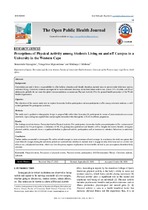Perceptions of Physical Activity among Students Living on and off Campus in a University in the Western Cape

Date
2020Author
Nyangiwe, Simamkele
Mgwambane, Tshegofatso
Malema, Makhaya
Metadata
Show full item recordAbstract
Background:
Universities are said to have a responsibility to offer holistic education and should, therefore, include ways to prevent risky behaviour such as
sedentary living. University students are expected to make informed decisions about their future endeavours. About 23% of adults and 8% of
adolescents globally do not meet the global recommendations on minimum Physical Activity (PA) for general health promotion of the World
Health Organisation.
Objective:
The objectives of the current study were to explore factors that lead to participation and non-participation in PA among university students, as well
as their preferred PA participation activities.
Methods:
The study used a qualitative ethnographic design to purposefully collect data from nine (9) participants by means of semi-structured one-on-one
interviews. Open coding was applied when analysing the transcribed data through the ATLAS.ti software programme.
Results:
The findings reveal six themes: Factors that lead to Physical Activity (PA) participation; factors that lead to non-participation in PA; environmental
convenience for PA participation; a definition of PA; PA participation preference and benefits of PA. Despite the known benefits of regular
physical activity, research shows a significant decline in physical activity participation and an increase in sedentary behaviour in university
students.
Conclusion:
Further studies are needed to interrogate PA and its related concepts to raise awareness of each concept. In conclusion, the study recognises that
since lifestyle changes during the university period are sustained into adulthood, students tend to engage in risky behaviour such as alcohol and
tobacco use, and physical inactivity, which may have long-term negative implications for their health and lead to poor perceptions about their body
structure.
